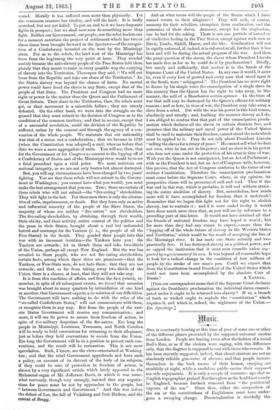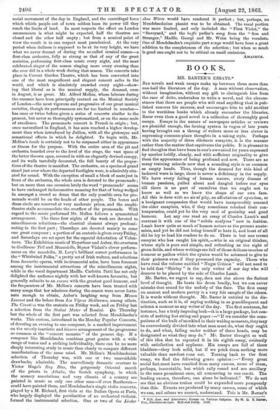Mus i c, ONE is constantly hearing at this time of year
of some one or other of the different phases presented by the supposed universal exodus from London. People are leaving town after the fashion of a social Bull's Run, or as if the cholera were raging, with this difference- only, that the disgrace is supposed to rest with those who remain. It has been recently suggested, indeed, that closed shutters are not an absolutely reliable guarantee of absence, and that people immure themselves in the back rooms of their houses, creeping out stealthily at night, while a credulous public envies their supposed sea-side enjoyments. It is only a couple of centuries ago that an. English topographist praised Northampton as the healthiest county in England, because furthest removed from "the pestilential vapours of the sea." Since then, either the composition of the sea or the constitutions of Englishmen must have under- gone a sweeping change. Decentralization is decidedly the social movement of the day in England, and the centrifugal force which whirls people out of town seldom loses its power till they reach the limits of land. In most respects the effect on London amusements is what might be expected, half the theatres are -closed and the other half empty ; but from a musical point of view the result is in one respect most paradoxicaL At the very period when dullness is supposed to be at its very height, we have what we never dreamt of during the so-called musical season—a first-class orchestra, fully as strong as that of any of the great societies, performing first-class music every night, and the most -celebrated singer of the season singing more every evening than he ever did in a whole week during that season. The concerts take place in Covent Garden Theatre, which has been converted into -one of the most magnificent and elegant concert salles in the world, and which is absolutely crowded every night—show- ing that liberal as is the musical supply, the demand, even in August, is as great. Mr. Alfred Mellon, whose labours during the summer have been principally centred on the Musical Society -of London—the most vigorous and progressive of our great musical societies, though its performances are far too limited in number— has once or twice before given a series of concerts similar to the present, but never so thoroughly systematized, or on the same scale of excellence. The promenade concert is French in origin ; but, once naturalized in England, it has soon reached a higher develop- ment than when introduced by jullien, with all the grotesque and sensational effects in which he delighted. To begin with, Mr. Mellon's locale is certainly not to be surpassed either in appearance -or fitness for the purpose. With the entire area of the pit and -orchestra boarded over to the level of the stage, the vast space of -the latter thrown open, covered in with an elegantly devised canopy,
-and its walls tastefully decorated, the full beauty of the propor- tions of the theatre is manifest. The orchestra, on a species of grand stand just over where the departed footlights were, is admirably situ- ated for sound. With the exception of small a block of seats just in front of the orchestra, the whole area is devoted to the promenade ; but on more than one occasion lately the word "promenade' seems to have exchanged its locomotive meaning for that of being wedged in amongst a crowd so dense that the only possible area for pro- menade would be on the heads of other people. The boxes and dress circle are reserved at very moderate prices, and the amphi- theatre stalls accommodate the overflow of the promenade. With -regard to the music performed Mr. Mellon follows a symmetrical arrangement. The three first nights of the week are devoted to miscellaneous selections—the classical element always predomi- nating in the first part ; Thursdays are devoted mainly to some one great composer ; a portion of an oratorio is given everyFriday, -and Saturdays are set apart for the especial delectation of Volun- teers. The Exhibition music of Meyerbeer and Auber, the overtures to Guillaume Tell and Masaniello, Signor Vialati's clever perform- -ances on the mandolin, M. Levy's brilliant cornet performance in the "Whirlwind Polka," a pretty- set of Irish waltzes, and selections from favourite operas, with instrumental solos, have been foremost -among the instrumental attractions of the miscellaneous nights, while in the vocal department Madlle. Carlotta Patti has not only delighted the audience nightly with her well-known favourite, but generally submits to an encore with the greatest good humour, and the frequenters of Mr. Mellon's concerts have been treated with many songs that her admirers during the season were never fortu- nate enough to obtain, Auber's laughing song from Manon Lescaut and the bolero from Les Wpres Siciliennes, among others. The Creation was the oratorio on Friday week, and on Friday last -a selection from the Stabat Mater of Rossini. Con Thursday last the whole of the first part was selected from Mendelssohn's works. This custom, introduced in the Monday Popular Concerts, -of devoting an evening to one composer, is a marked improvement -on the utterly inartistic and bizarre arrangement of the programme so common at the "concert monstre " of the present day. If a composer like Mendelssohn combines great genius with a wide range of tastes and a striking individuality, there can be no more deeply interesting study in music than closely to compare different manifestations of the same mind. Mr. Mellon's Mendelesohnian selection of Thursday was, with one or two unavoidable drawbacks, admirable. The marvellously dramatic overture to Victor Hu,go's Buy Bias, the gorgeously Oriental march of the priests in Athalie, the Scotch symphony, in which the scenery associations and very climate of a country are painted in music as only one other man—if even Beethoven— could have painted them, and Mendelssohn's single violin concerto, played by a M. Richard, first viola at the Italian Opera at Paris, who largely displayed the peculiarities of an orchestral violinist, formed the instrumental selection. One or two of the Lieder ohne W5rte would have rendered it perfect ; but, perhaps, no Mendelssohnian pianist was to be obtained. The vocal portion was more limited, and only included the "First Violet," the "Savoyard," and the buffo pedlar's song from the "Son and Stranger," Madlle. Greorgi and Mr. Weiss being the vocalists. One of Mendelssohn's exquisite part songs would have been a great addition to the completeness of the selection ; but when so much is good one ought not to be critical on small omissions.
AMATEUR.































 Previous page
Previous page